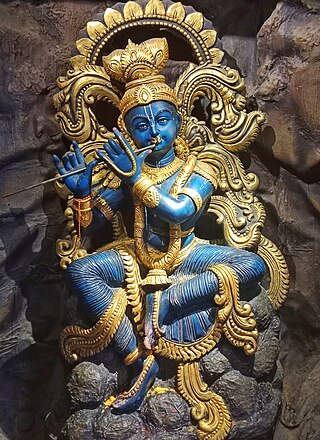Top Qs
Timeline
Chat
Perspective
Achyuta
Epithet of Krishna or Vishnu From Wikipedia, the free encyclopedia
Remove ads
In Hinduism, Achyuta (Sanskrit: अच्युत, lit. 'the infallible one', IAST: Acyuta) is an epithet of Vishnu[1] and appears as the 100th[2] and 318th names in the Vishnu Sahasranama. It is also often used in the Bhagavad Gita as a personal name of Krishna. According to Adi Shankara's commentary on the 1000 Names of Vishnu, Achyuta means "one who will never lose his inherent nature and powers". The name also means "immovable", "unchangeable", and as such is used for "the one who is without the six transformations, beginning with birth".[3]

Remove ads
Literature
- "Arjuna said: O infallible one (Achyuta), please draw up my chariot between the two armies so that I may see those present here desiring to fight, and know with whom I must contend in this great trial of arms." (Bhagavad Gita Chapter 1, verses 21-22)
- Arjuna speaking: "Thinking of You as my friend, I have rashly addressed You "O Krishna", "O Yadava", "O my friend", not knowing Your glories. Please forgive whatever I may have done in madness or in love. I have dishonoured You many times, jesting as we relaxed, lay on the same bed, or sat or ate together, sometimes alone and sometimes in front of many friends. O infallible one (Acyuta), please excuse me for all those offences." (Bhagavad Gita, Chapter 11, verses 41-42)
- Arjuna speaking: "Destroyed is my delusion, as I have gained my memory (knowledge) through your grace, O Achyuta. I stand firm with my doubts dispelled. I shall act according to your word." (Bhagavad Gita, Chapter 18, verse 73)
Remove ads
Theological Interpretation
In the Vishnu Sahasranama, the name Achyuta is listed as the second among the thousand names of Vishnu, and by extension, Krishna. The name is traditionally interpreted as "one who does not fall" – from his essential nature, from truth, or from eternal dharma.
According to Adi Shankaracharya’s commentary on the Vishnu Sahasranama (Sahasranama Bhashya), Achyuta means "one who will never lose his inherent nature and powers." Shankaracharya emphasizes that the Lord remains unchanging, unaffected by time, circumstance, or illusion, and cannot fall from his divine status or knowledge.[4]
The name is frequently used in devotional literature to highlight the infallible and unalterable nature of the deity, especially in Vaishnava traditions.
Remove ads
See also
References
Wikiwand - on
Seamless Wikipedia browsing. On steroids.
Remove ads
